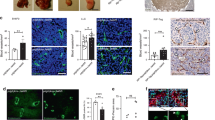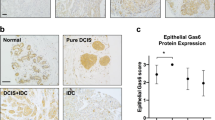Abstract
Angiogenesis is an essential requirement for tumour growth and metastasis and is regulated by a complex network of factors produced by both stromal cells and neoplastic cells within solid tumours. The cytokine tumour necrosis factor alpha (TNF-alpha) and the enzyme thymidine phosphorylase (TP) are two factors known to promote tumour angiogenesis. We have demonstrated recently that high numbers of tumour-associated macrophages (TAMs) are significantly associated with increased tumour angiogenesis and poor prognosis in invasive carcinoma of the breast. We have also shown that TAMs are a major source of TNF-alpha in invasive breast carcinomas, and that macrophage-like stromal cells as well as tumour cells synthesize TP in such tumours. However, little is known of the factors that regulate the production or activity of these factors in the tumour microenvironment. As TNF-alpha has been shown to up-regulate TP expression in tumour cells in vitro we performed an immunohistochemical study to investigate the possibility that TNF-alpha may be involved in the regulation of TP expression by malignant breast epithelial cells in vivo. To do this, we used a cocktail of non-neutralizing monoclonal anti-TNF-alpha antibodies to visualize both TNF-alpha-expressing macrophages and TNF-alpha bound to its receptors on tumour cells and endothelial cells in a series of 93 invasive carcinomas of the breast. A semiquantitative grading system was then used to compare these staining patterns with that for TP in the same biopsies. TNF-alpha immunoreactivity was also compared with various important tumour variables known to relate to outcome in this disease (microvessel density, node status, grade, stage, receptor status and macrophage infiltration), as well as relapse-free and overall survival data for these patients. Our data show significant positive correlations between TNF-alpha bound to its receptors on tumour cells and: (1) TP protein production by tumour cells, and (2) axillary lymph node status (i.e. metastasis). These results suggest that tumour cell responsiveness to TNF-alpha produced by neighbouring TAMs may play a part in the regulation of TP expression by tumour cells as well as their metastatic behaviour. This may explain, in part, the relationship between increased macrophage infiltration and angiogenesis in breast cancer, and further supports the contention that TAMs may represent an important target for future anti-angiogenic therapies.
This is a preview of subscription content, access via your institution
Access options
Subscribe to this journal
Receive 24 print issues and online access
$259.00 per year
only $10.79 per issue
Buy this article
- Purchase on SpringerLink
- Instant access to full article PDF
Prices may be subject to local taxes which are calculated during checkout
Similar content being viewed by others
Author information
Authors and Affiliations
Rights and permissions
About this article
Cite this article
Leek, R., Landers, R., Fox, S. et al. Association of tumour necrosis factor alpha and its receptors with thymidine phosphorylase expression in invasive breast carcinoma. Br J Cancer 77, 2246–2251 (1998). https://doi.org/10.1038/bjc.1998.373
Issue Date:
DOI: https://doi.org/10.1038/bjc.1998.373



